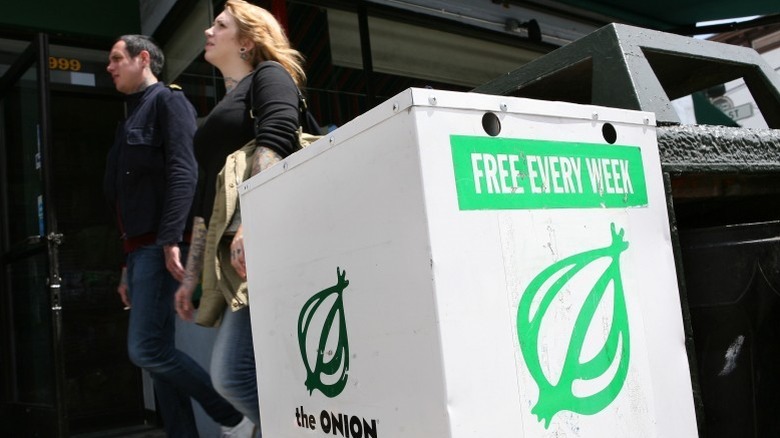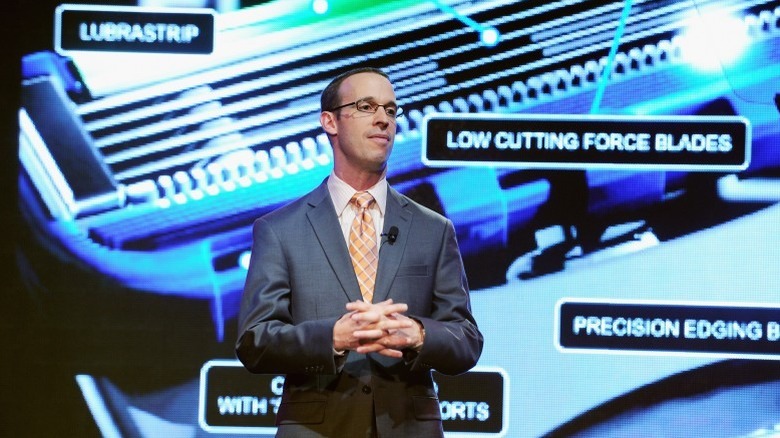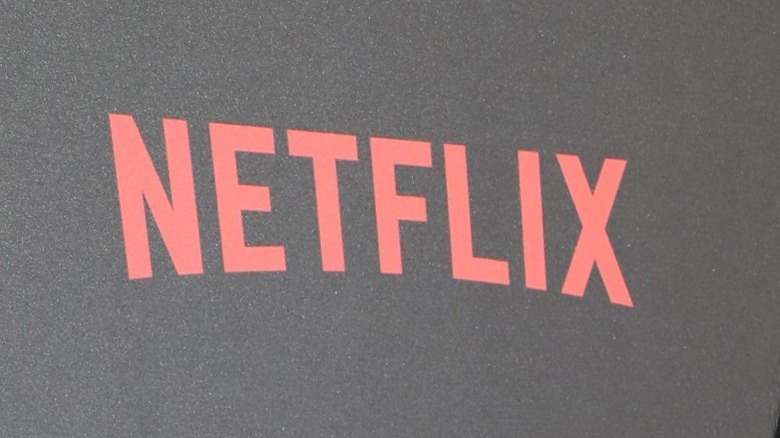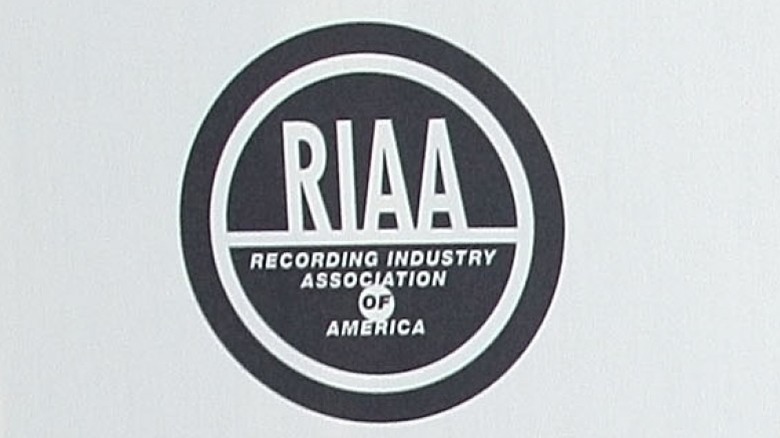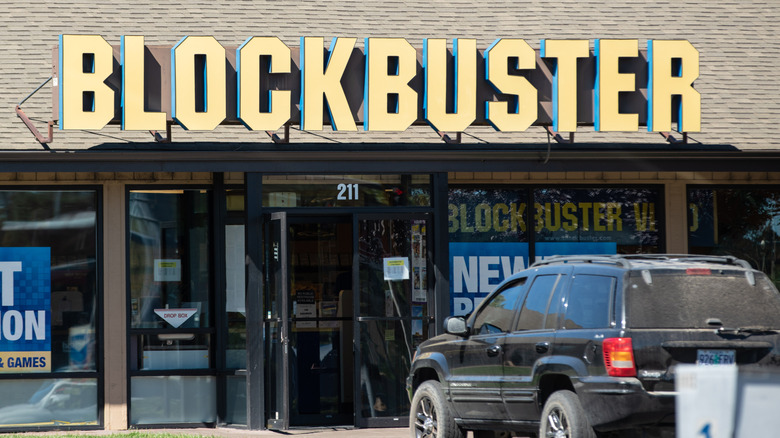Headlines From The Onion That Later Came True
First founded in Madison, Wisconsin, The Onion began life as a low-key collegiate humor newspaper, before expanding into something far greater. Now a mainstay of off-kilter news online, with a full site that puts its askew spin on everything from news to politics to the entertainment industry, the gag rag is a multimedia force to be reckoned with.
However, is it also a fortune teller with a far better track record than the Psychic Friends Network (who clearly weren't prescient enough to predict their own collapse)? Whether it's staffed with notable seers or just has a good handle on cultural trends, the parody paper has managed to predict the future on numerous occasions. Here are some headlines from The Onion that later came true.
Area Man Consults Internet Whenever Possible (2000)
During its formative years, few truly imagined how much of our lives the Internet would absorb into its folds, with one possible exception: The Onion.
While the World Wide Web was still teething in 2000, "America's Finest News Source" ran a prophetic piece about a Columbus, Ohio, office manager named Larry Wisniewski who shuns methods like using the phone or leafing through the newspaper for movie times. Instead, he consults the Internet (which, in the year 2000, takes much longer and requires much more work than alternatives do). His wife, Pam, bemoans the man's continued insistence on using the web to surf for driving directions, the latest recipes, and look up academic institutions. Aside from the amusing moments of insight about the emergent Internet, the lampooning article nailed the issue on the head. The Onion already saw the next generation, with our nearly walk-into-streetlamps-rather-than-miss-the-latest-tweet attitude, growing dependence on online information, and quirky methods of eschewing perfectly functional communications devices such as our mouths.
The article ends with a flippant false quote that rings true to today, as Wisniewski grumbles, "Pam is always asking stuff like 'Why don't we just look the word up in our old-fashioned dictionary?' The answer, of course, is simple: because we don't have to."
F*** Everything, We're Doing Five Blades (2004)
Shaving is such a pain in the neck: You have to stand over the sink, smear mentholated white goop all over your mouth, and then run a razor-sharp blade across your bumpy face. Gah. Over the years, many companies sought to expand this smoothest of industry, trying to stay on the cutting edge of shaving by exploiting America's fear of facial hair.
The Onion's 2004 article lampoons the goofiest conventions of the competitive razor market, with Gilette's desire to outstrip their competitor's low-blow move of adding a fourth blade to their shaving device. In one of the joke paper's classic rants, a company spokesperson goes off on the industry, taking shots at Norelco's electric razors and Bic's pen-based side business, before detailing his plan to create a (gasp) five-bladed razor, complete with not just an aloe strip, but a foaming lather strip as well.
Admittedly, following the quad-razor's arrival, a fifth blade was inevitable. In the mid-00s, Gillette's Fusion5 was released with the prophesied five blades. Nevertheless, one has to wonder if the company (and their dual-lubricating strips) didn't take a little inspiration from everyone's favorite satirists, if you can set aside Occam's Razor.
Overstock.com Announces Plans To Develop Original Programming (2013)
Ever since some clever bloke or lass discovered that people can watch TV on their computers, companies have scrambled to hop on the bandwagon. Since the early days of Netflix and iTunes, the number of available services has increased exponentially. As a result, even a few surprising parties have gotten into the mix, including massive online retailer Overstock.com, in a move that few saw coming — aside from The Onion of course.
In 2013, the jokesters spun a prognostic piece about the e-wholesaler jumping on the video-on-demand bandwagon. Included in the article were gags about the fresh streamer developing a "single-camera situation-comedy starring Jason Schwartzman." The tongue-in-cheek publication showed either an impressive prescience or inspirational nature, when in 2015, the retailer announced their intentions to compete with Amazon and other major streaming services. Since then, the company hasn't released any status updates on its VOD service, so Overstock's dreams of tragedy next to the towels and comedy beneath carpets may not have come to fruition, or still remain in the early phases.
Wealthy Teen Nearly Experiences Consequence (2008)
Long before the world "affluenza" swept through the media landscape, The Onion satirized the heck out of spoiled brats always getting their way. In a 2008 article, the pseudo-newshounds set up the tragic story of a young man who nearly faces the horrors of watching his name get dragged through the courts for an accident he causes when driving drunk. Thanks to his wealthy parents and their connections, he's able to escape any real punishments for his Goldschlager-fueled destruction, and the article ends with a sage and class-sentient final sentence: "The other four victims of the crash remain in intensive care at St. Peter's University Hospital, suffering from conditions ranging from poor to lower-class."
The piece was a brilliant satire of the news media's overbearing coverage of privileged individuals, often at the expense of the real victims. It also proved tragically ahead of the curve, as a similar scenario took place merely five years later. In 2013, after partying and drinking, wealthy and sheltered Texas 16-year-old Ethan Couch hit the roads, killing four people and injuring several others. His expensive legal team's affluenza defense — a mental disorder that supposedly precludes wealthy youths from facing any consequences for their acts — managed to become one of the craziest criminal defenses that actually worked. Couch's wrist-slap sentence continued his life of minimal repercussions and also outraged the country.
New $5,000 Multimedia Computer System Downloads Real-Time TV Programs, Displays Them On Monitor (1998)
In 1995, streaming was in its infancy. Anyone trying to catch a live-broadcast sports event or a radio show on the web was treated to a painfully long wait and frequent buffer times, all while the good old dial-up modem buzzed and hissed frustrations to epic levels. Sure, technology made some serious leaps and bounds in those days, but the idea of watching an entire movie or TV show on the computer was as laughable to GenX as the idea of reading personal computers was to the punch card set. Only satirical news sources like The Onion japed futuristically about the revolutionary move of watching television on a computer instead of a TV screen, as detailed in a story from 1998.
Their exciting faux-development, which detailed the 75-minute download of an eight-minute segment of "3rd Rock From The Sun," may have mocked the "grainy" image moving across the window at "six frames per second," but beneath the article's tongue-in-cheek nature was a hint of things to come. Less than 10 years later, Netflix, Microsoft, and Apple would kick-start the streaming revolution that changed the way many viewed movies and television. Now, people regularly blow entire weekends without even blinking, bingeing on "Buffy the Vampire Slayer" and "The Real Housewives" without giving true respect to the all-seeing eye of The Onion, which predicted the creation of Netflix.
RIAA Sues Radio Stations For Giving Away Free Music (2002)
The Onion's clever 2002 article arrived during a time when person-to-person file-sharing services like Napster came under heavy fire for piracy, and high-profile cases like Metallica's Napster lawsuit dominated the news. In the article, the Recording Industry Association of America (RIAA) feels it's being cheated of its profits, and musicians are losing out on their royalty checks. As a result, they sue radio stations for piracy, something which almost happened five years later.
In 2008, the RIAA talked about suing radio stations, condemning their broadcasts as "a form of piracy." Much like in the prescient article, the RIAA, along with MusicFirst, demanded radio stations pay royalties to continue playing their music, claiming that any commercials go ignored. The National Association of Broadcasters, of course, retorted that they shouldn't have to pay royalties because of the amount of exposure recording artists receive through their broadcasts. Unsurprisingly, the battle of the haves versus the have-about-the-sames continues to this day.
Family Lets Cars Come Inside House During Snowstorm (2015)
Americans are often said to have a love affair with their cars, especially in commercials created by auto manufacturers. Naturally, there are times when a family's love of their ride seems a little over-the-top. Such a story occurred fictionally in 2015, when The Onion published an amusing newsflash about a Massachusetts family that took their vehicular affections to the extreme. With another fierce Nor'easter headed to town, about to drop copious amounts of snow and frigid temperatures, the Wallace family decides they just can't bear to watch their SUV or their sedan suffer. To keep them warm, they pull their cars inside, letting them curl up to their living room hearth.
Not to be outdone by fiction, reality followed suit in 2016. Fearful of the destructive force of Hurricane Matthew, a Florida woman and her fiancé took drastic action to protect her sedan. Seeing as the one-car garage already housed his automobile, they popped the sliding doors off their patio and drove their car right inside. Fortunately, the storm passed without hitting their area.
Stephen King: 'I Don't Even Remember Writing The Tommyknockers' (1999)
Since his freaky first work of long-form fiction "Carrie" saw publication in 1974, Stephen King has become the undisputed king of horror. With dozens of novels, collections, and film adaptations floating around, the terror maestro has also become the butt of a few jokes (including some of his own design).
Back in 1999, The Onion ran a jape column authored by none other than "Mr. King." In it, he claims to have absolutely no recollection about writing his mid-era novel, "The Tommyknockers": "After reading the plot synopsis, I sort of remembered it, but, then again, maybe it just sounded like something else I wrote. After your 50 or 60th one, it's all kind of a blur ... it sounds like my kind of thing." Of course, The Onion's tease mostly prodded King about his expansive oeuvre and the genre conventions he helped invent. At the same time, there was a certain ring of truth behind the article — a sadder one — that was later revealed.
In yet another example of satire meets life, the prolific author admitted in his book, "On Writing," to having almost no memory of crafting his dog-attack classic, "Cujo." Instead of author burnout, King's memory gap resulted from serious drug and alcohol misuse issues. Consequently, he says the book's inception is mostly a blur. Fortunately, the author has been sober since the late '80s.
New, Delicious Species Discovered (2005)
The world is filled with, well, amazing stuff. Each year brings the discovery of dozens of new wonders and the extinction of another thousand older, yet still cool wonders. With so much of our big blue sphere explored, it's always a bit of a shock when researchers discover something new, curious, and really, really tasty. In a 2005 article, The Onion documented the detection of a brand-new species of monkey in Manaus, Brazil. The cadre of international researchers are stoked to uncover a kitten-like simian, exclaiming excitedly that "few scientists are lucky enough to discover a new species, let alone a mammal with a palatability on par with a tender, juicy steak."
The joke paper's discovery was almost parroted sardonically in 2010, after National Geographic brought a report from Myanmar, detailing the unveiling of a previously undocumented snub-nosed monkey. Sadly, this new critter was already on the endangered list when scientists classified it, due to the "local demand for monkey meat," as well as hunting and logging interests in the region. In fact, the sole specimen at the time of the discovery had been killed by hunters, and was eaten after the researchers made their findings.
Historic 'Blockbuster' Store Offers Glimpse Of How Movies Were Rented In the Past (2008)
In 2008, The Onion's cable news-skewing video channel Onion News Network produced a quirky human interest feature about a new tourist museum that re-created for modern humans a popular and now quaint and peculiar activity of the past, supposedly lost to history: renting a movie, recorded onto physical media, at a brick-and-mortar video store.
The clip was clearly alluding to the meteoric rise of Netflix, whose DVD-rental-by-mail and then streaming video service pretty much killed the ritual and reality of physical video stores, such as industry dominator Blockbuster. Within a decade, the majority of Americans got their entertainment digitally from Netflix (and Apple, Amazon Video, Hulu, Disney+, and HBO Max) while Blockbuster, unable to adapt to the changing market, filed for bankruptcy in 2010.
After the rise and sudden fall of Blockbuster, as of 2025, only one Blockbuster Video remains. Operators, who license the Blockbuster name, signage, and other elements from the defunct company's rights holders, run a bustling video store in Bend, Oregon. It's become a tourist attraction, where thousands of daily visitors nostalgically wander the aisles and take photos, and can even rent the location out for the night. The living museum of '80s and '90s culture — which might seem absolutely bizarre today — was even the subject of its own documentary, "The Last Blockbuster."
Even CEO Can't Figure Out How RadioShack Still In Business (2007)
Years before computers were commonplace, and when they were a niche, hobbyist pastime, RadioShack was the place to go for parts and components, as well as a popular stop for inexpensive, consumer-level electronic gadgets and appliances, like headphones, radio-controlled cars, telephones, and stereo speakers. At one point, more than 7,400 RadioShacks were operational. But that was in 2004, by which point big box stores like Best Buy and Target (and online merchants, particularly Amazon) could sell everything RadioShack did, but for less, and with more variety.
It's kind of surprising that RadioShack lasted as long as it did, which is the comic through-line of a 2007 article that ran in The Onion, positing that newly appointed RadioShack CEO Julian Day couldn't fathom how the company was still kicking. "You wouldn't think that people still buy enough strobe lights and extension cords to support an entire nationwide chain, but I guess they must, or I wouldn't have this desk to sit behind all day," the fake newspaper fake-quoted Day, adding that the sales figures failed to "add up."
The writing was on the wall, according to The Onion, and in 2015, the prediction came true. That's when RadioShack filed for bankruptcy after nearly 100 years in business. By 2025, the chain of many thousands had shrunk to six outlets, an e-commerce site, and a number of authorized resellers that are not branded as RadioShack.
Man Just Buying One of Every Cleaning Product In Case Trump Announces It's Coronavirus Cure (2020)
The World Health Organization officially declared COVID-19 a pandemic on March 11, 2020. In those early weeks of the coronavirus, medical authorities didn't know much about how the relatively new and potentially deadly virus could be treated. Meanwhile, millions stocked up on and stockpiled cleaning supplies, hoping to remove any trace of the mysterious coronavirus from their homes, possessions, and selves. On March 25, 2020, The Onion poked fun at the fear. "I got toilet bowl cleaner, carpet cleaner, Swiffer WetJet refills — you name it — just so me and my family will be ready ..." fictional Troy Mitchell said. "I'm not getting caught without some oven degreaser should Trump say it's going to save us." As it turns out, the joke neatly predicted the future.
During a televised coronavirus task force media briefing in April 2020 (via the BBC), U.S. Department of Homeland Security executive William Bryan discussed a study that found bleach and rubbing alcohol could quickly kill the virus in saliva and respiratory fluids. "And then I see the disinfectant where it knocks it out in a minute," President Donald Trump weighed in. "And is there a way we can do something like that, by injection inside?" Health experts quickly weighed in to refute the president's suggestion to ingest or inject cleaning products, as that could be fatal.
U.S. Soothes Upset Netanyahu With Shipment of Ballistic Missiles (2015)
In 2015, President Barack Obama's administration brokered a deal with Iran, which allowed the Middle Eastern nation to develop a nuclear power program but severely limited its ability to build nuclear weapons and brought in billions of dollars worth of aid into the country.
The U.S. and Iranian governments have traditionally not been the closest of allies, unlike the strong arrangement between the U.S. and Israel, which has remained in a state of intense, if not violent, conflict with Iran for more than 40 years. Understandably, Israeli Prime Minister Benjamin Netanyahu was concerned by the U.S.-Iran agreement. In July 2015, Netanyahu spoke with Obama on the phone about the deal, and to assuage his fears, the American president reportedly offered the Israeli prime minister an extensive offensive and defensive upgrade to the Israel Defense Forces. A deal was reached between the two leaders in 2016.
A day before news of the phone call broke, The Onion ran the story, "U.S. Soothes Upset Netanyahu With Shipment of Ballistic Missiles," in which Netanyahu was pacified and satisfied with a gift of military-grade weaponry. "Bibi always gets a little cranky when he sees us talking to Iran, but a few dozen short-range surface-to-surface missiles usually cheer him right up," State Department spokesperson Daniel Goldman "said."
Hershey's Ordered To Pay Obese Americans $135 Billion (2000)
In July 2000, a jury in Florida approved $145 billion in damages for as many as 700,000 smokers. The class-action lawsuit found tobacco companies liable for the deleterious health effects suffered by the plaintiffs, as it was aware of the dangers of its products. The Onion speculated if other industries that sold less-than-healthy products could also be held accountable in court. Two weeks after the Florida ruling, The Onion ran the story "Hershey's Ordered To Pay Obese Americans $135 Billion." According to the fantastical story, America's biggest chocolate bar company was found to have placed nuts and nougat in products even though it was aware they were unhealthy. "If you knowingly sell products that cause obesity, you will pay," Pennsylvania Attorney General Andrew Garsten said in a spurious quote.
In a case of life imitating art imitating life, Ferrero effectively lost a class action lawsuit in 2012. Athena Hohenberg, mother of a toddler, initiated the suit when she discovered that Ferrero's flagship product, the sweetened chocolate and hazelnut spread Nutella, was chock-full of sugar and a serving had more calories than an equivalent amount of syrup or jam. Hohenberg's attorneys posited that Ferrero's advertising and marketing materials suggested that Nutella was a healthy and wholesome food, when it really wasn't. The Italian food manufacturer, which also makes candies including Ferrero Rocher and 100 Grand, agreed to pay plaintiffs $3 million.
Billionaires Demand More Federal Scrutiny (1996)
In 1996, years before Occupy Wall Street and similar movements fueled widespread animosity toward billionaires, The Onion ran a phony news article that turned the idea on its head to draw attention to the real-life issue of unchecked wealth and power. "Billionaires Demand More Federal Scrutiny," the headline called out. The news piece supposed that a group of 30 of the United States' wealthiest individuals testified before Congress, asking for the government to step in and provide the limits they apparently need, and to stop letting them exploit the system for solely their own gain. "In addition to millions in federal tax write-offs, we have been the beneficiaries of cushy tax-deferred annuities," not-real tycoon J. Wellington French said. "We are here today to stand up and finally say, 'Enough!'" Then the billionaires occupied the White House lawn holding placards that read: "We Demand Justice."
Microsoft founder Bill Gates is among the wealthiest people in American history, and in the 2010s he volunteered to give more money to the government. "I need to pay higher taxes," Gates said in a 2018 interview (via CNBC). "I've paid more taxes, over $10 billion, than anyone else, but the government should require people in my position to pay significantly higher taxes." Another multi-billionaire, Warren Buffett, agrees. "The wealthy are definitely undertaxed relative to the general population," he said on a 2019 episode of CNBC's "Squawk Box."
Mar-A-Lago Assistant Manager Wondering If Anyone Coming To Collect Nuclear Briefcase From Lost And Found (2017)
In a photo accompanying a March 2017 article called "Mar-A-Lago Assistant Manager Wondering If Anyone Coming To Collect Nuclear Briefcase From Lost And Found," a leather satchel sits inside a plastic bin among other random items, and it purportedly contains the information and equipment necessary to unleash the U.S.'s nuclear weaponry. While the piece makes no direct or explicit mention of Donald Trump, it's strongly implied that he was the person who somehow misplaced that extremely important briefcase, because it was found two weeks earlier in the dining room at Mar-a-Lago, the Florida resort owned and frequented by the president.
While the nuclear briefcase was never lost or abandoned at Mar-a-Lago, sensitive materials relating to the federal government's nuclear weapons were discovered at the resort. Found after Trump left office in 2021, the documents were kept in cardboard storage boxes at Mar-a-Lago, often in rooms accessible to the public.
U.S. Quietly Slips Out Of Afghanistan In Dead Of Night (2011)
The United States led a military coalition into Afghanistan, following the terrorist attacks of September 11, 2001. Designed to fight the ruling Taliban regime and root out al Qaeda, the militant organization believed to be responsible for the attacks, troops were stationed for years without making much progress, according to pundits. Due to various political and military issues, experts were calling the war in Afghanistan tough to win by 2011, and that the U.S. military should carefully withdraw. In the wake of such talk, The Onion ran the piece "U.S. Quietly Slips Out Of Afghanistan In Dead Of Night." In the July 2011 article, military commanders pulled out the entire 100,000-person contingent, leaving a note at their former headquarters of Bagram Airfield in Kabul. "By the time you read this, we will be gone. We regret any pain this may cause you, but this was something we needed to do," the fictional note read.
It took another 10 years, but the American military did leave Afghanistan, and it happened very much like The Onion jokingly theorized that it would. The administration of President Donald Trump negotiated an exit in February 2020, with a full withdrawal date of May 1, 2021. When Joe Biden became president, he pushed back that target to August 2021, but over the Fourth of July weekend, the entire personnel of Bagram Airfield in Kabul left under the darkness of night. The move wasn't announced until after it happened, and the few troops remaining in the nation's capital, Kabul, left at the end of August.
'Time' Magazine Subscribers Brace For Inevitable Issue With Close-Up Of Ted Cruz's Face (2015)
In 2015, Texas Senator Ted Cruz announced his intention to pursue the Republican nomination for President of the United States in the upcoming federal election. Over several years of unofficial campaigning and making himself into a more nationally known personality, Cruz endured a reputation as an unlikeable candidate, one who might not have the charm or ability to unite different large swaths of the electorate necessary to become president. With a nod to the conventional wisdom and generalized opinion of Cruz at the time, The Onion announced the senator's presidential candidacy with the headline, "'Time' Magazine Subscribers Brace For Inevitable Issue With Close-Up Of Ted Cruz's Face." In the world of the article, quoted parties predicted that 'Time' would label Cruz "The Firebrand" or "The Game Changer." "I don't know whether it will be next week or 10 months from now, but I know that sooner or later I'll open the mailbox and find that face staring at me," the piece quoted, attributing it to fictional 'Time' reader Susan Bartlett.
Days after The Onion ran its Cruz story, 'Time' really did put out an issue in 2015 with Senator Cruz's face, smirking and in a tight close up. Taking a more objective tone than the satirical newspaper, the face of the smiling Cruz was captioned, "Likable enough?"
Republicans Vote To Repeal Obama-Backed Bill That Would Destroy Asteroid Headed For Earth (2011)
During his first term, President Barack Obama, a Democrat, faced stiff resistance from congressional Republicans. It felt like President Obama's political opponents blocked any legislation proposed as a matter of course, and The Onion picked up on that sentiment when it ran an article in 2011. Suggesting that GOP leaders would thwart any Obama idea even at their own detriment and demise, The Onion published the story, "Republicans Vote To Repeal Obama-Backed Bill That Would Destroy Asteroid Headed For Earth. " The piece imagines that all 242 Republicans in the House of Representatives worked in concert to strike down the Asteroid Destruction and American Preservation Act, a $440 billion measure that would pay for the technology necessary to stop an asteroid on its way to the Earth, whose impact would rate as an extinction level event.
In 2013, Obama was in the midst of his second presidential term, and he still faced extensive pushback from Republicans. He advocated for a bill that would pay for a NASA project to send an unmanned craft into space in 2018 to meet up with an asteroid, latch onto it, and then pull it nearer the Earth to allow scientists to study it and learn more about interstellar objects. The legislation died in a House of Representatives committee, specifically the House Committee on Science, Space, and Technology. All 22 appointed Republicans voted to prevent NASA from examining the asteroid.
